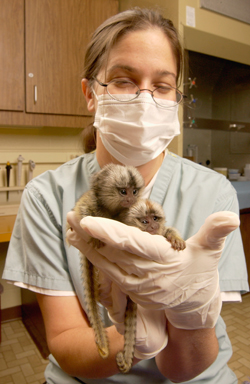Humane Treatment of our Animals
Dedicated Veterinary Staff
Seven full-time veterinarians, assisted by more than 130 combined veterinary technicians and animal care staff at Texas Biomed’s Southwest National Primate Research Center, provide for the humane care and treatment of our primates. The Primate Center also ensures that the institution complies with all federal regulations and national guidelines that apply to the care and use of animals in research.
The care of animals at Texas Biomed is guided by two principles.
- Animals deserve high-quality care and state-of-the-art preventive medicine
- High-quality scientific data can be derived only from animals that are treated humanely and provided with proper care.
Both physical and emotional stress can negatively affect the quality of normative scientific data derived from the animals. Thus, humane animal care and good science go hand in hand.
Ensuring the psychological wellbeing of the nonhuman primates at Texas Biomed is an animal management priority. To address this need, the Institute has an active environmental enrichment program managed by a team of dedicated animal behavior specialists and caretakers.
Most of the primates at SNPRC are housed in social groups with access to indoor and outdoor living areas.
The SNPRC has excellent accredited facilities and equipment, including fully equipped treatment rooms, surgical suites, radiology facilities, ultrasound facilities, and clinical pathology and histopathology laboratories.
Registered with the USDA
The U.S. Department of Agriculture (USDA) – Animal and Plant Health Inspection Service (APHIS)conducts unannounced inspections of the SNPRC animal facilities at least once per year.
The USDA enforces the Animal Welfare Act, the main federal law that mandates standards and guidelines for the care and use of animals in all research facilities. Texas Biomed and the SNPRC operate under this law’s standards and guidelines specific to nonhuman primates.
Under the Animal Welfare Act, the USDA issues and enforces regulations regarding humane care, handling, treatment and transportation of nonhuman primates in addition to general husbandry standards related to housing, separation of species, cleanliness, feeding, quarantine procedures, and veterinary care. The law also contains provisions for the use of anesthesia or pain-killing drugs for potentially painful procedures and for the post-operative care of laboratory animals.
Adherence to Federal Policies
The Texas Biomedical Research Institute receives 70 percent of its research funding from the National Institutes of Health and other funding agencies through competitive grants and contracts. All institutions that receive NIH support are required to file an Animal Welfare Assurance Statement with the Office for Human Research Protections (OHRP) of the NIH. Texas Biomed and the SNPRC are in compliance with the “Public Health Service Policy on Humane Care and Use of Laboratory Animals.”
Accredited by AAALAC, International
Texas Biomed has been accredited since 1973 by the Association for the Assessment and Accreditation of Laboratory Animal Care, International (AAALAC). This organization conducts a site visit every three years to ensure that the highest standards of animal care are maintained. We received full accreditation in March 2015 for another three years.
The NIH recognizes AAALAC accreditation as a means of achieving and maintaining stringent standards for all aspects of the care and use of research animals.
Adherence to National Academy of Science Guidelines
Texas Biomed and the SNPRC maintain strict adherence to the guidelines provided in the “Guide for the Care and Use of Laboratory Animals,” which is prepared by the National Research Council of the National Academy of Sciences through the Institute for Laboratory Animal Research.
Institutional Animal Care and Use Committee (IACUC)
Federal law requires that every facility conducting research on animals have an Institutional Animal Care and Use Committee. This internal committee, which includes Texas Biomed scientists and veterinarians, also includes an outside member of the community. The committee must approve each protocol before an experiment is initiated. It also must inspect the animal facilities twice a year. The committee requires justification of the choice of animal to be used, the numbers of animals to be used, and the proposed treatment of the animals.
The IACUC has the authority to prevent a research program from being initiated or to stop a research program if the committee determines that an investigator is not complying with the regulations or guidelines for the care and use of animals.
Other Helpful Sites
Do you have more questions about animal research? A wealth of information is available from the following groups:
- Foundation for Biomedical Research
- Americans for Medical Progress:
- National Association for Biomedical Research
Working on a research project about animals in research?
Our accrediting organization, the Association for Assessment and Accreditation of Laboratory Animal Care International, also known as AAALAC International has a Student Information page that answers students’ most frequently asked questions.

